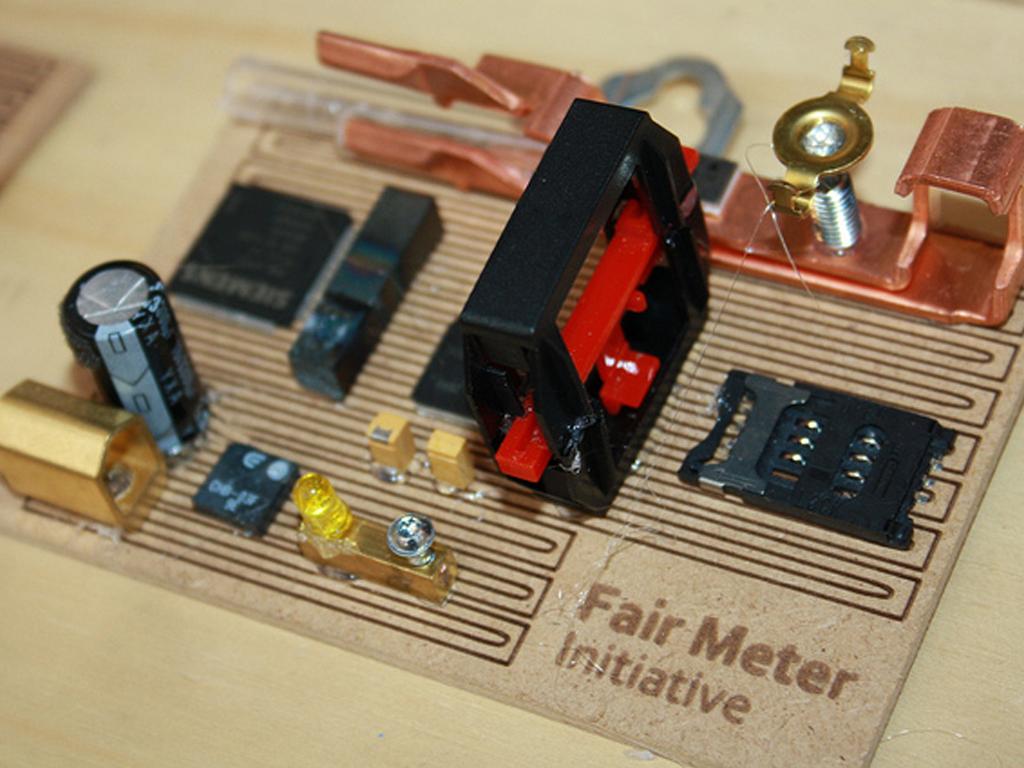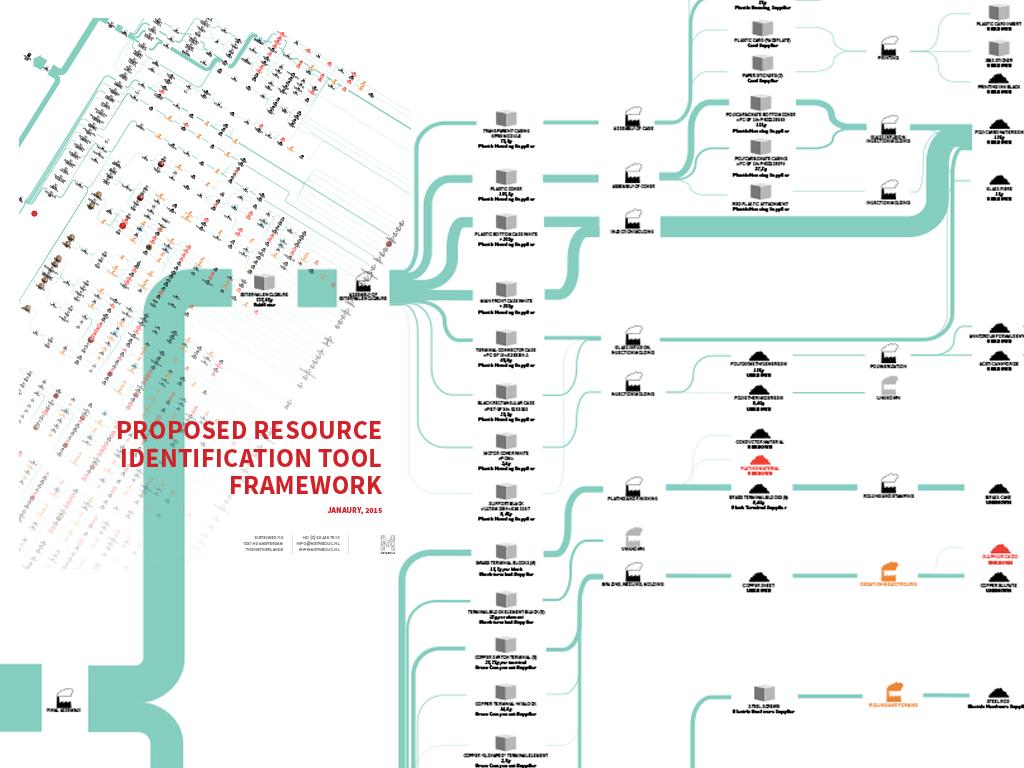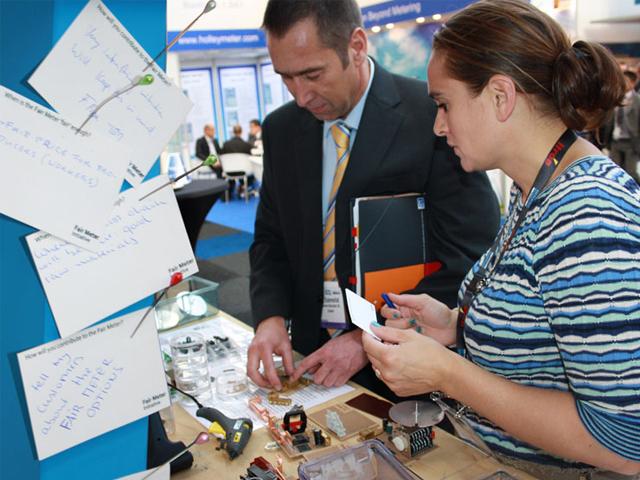Resources are running out and technology advances. There is a need for smart solutions in the energy sector. To explore the possibilities for this, Alliander and Waag started the Fair Meter Initiative. And with 14 million meters in Holland alone, making them smart and fair is a huge opportunity!
A fair meter: what should it look like? How should it work and what should it consist of? And when do we think of a meter as fair? During a two-day lasting bootcamp, nine participants worked in teams on concepts for a fair meter that were presented to various stakeholders at the European Utility Week in the Amsterdam RAI on October 16.
Bootcamp Fablab Amsterdam
The bootcamp started at the Fablab Amsterdam on Monday, with taking apart an existing meter to find out what the teams were actually dealing with. Where can we find chances to make the meter smarter of more fair? Hans Nooter (MVO Manager, Alliander) stated that a fair meter should be good for planet, people and prosperity. A good starting point. Next, the groups worked for two days on various concepts, focusing on the ‘concept of fair’, ‘the fair chain’ and ‘empowering consumers’.
The concept of fair
This group consisting of Miquel Ballester (Fairphone), Lodewijk Loos (Waag) and Arno Tuinman (Alliander) came up with the idea of a competition: How smart can you get? For them, the most important aspect was to involve all stakeholders: NGO’s, consumers, geeks, hackers and the business. Secondly, you need to set smart criteria on which all the stakeholders agree. Then it is time for people to present their proposals in an open tender, after which you can vote for the winners. Who will make ‘fair’ the new ‘smart’?
The fair chain
Janine Huizenga (HKU), Henk Buursen (Waag) and Martin Werker (Alliander) talked about new roles in the sector and about working user centered. The main issue they addressed is having control and ownership of the data in relation to trust. Where does the collected data go? Who owns it? For consumers, it often feels that big, faceless companies store their data. Corporate institutions should thus find a way to become a person that one can talk to, instead of on becoming a data farm. Sharing data should become a personal transaction. They also came up with the idea of sharing energy: if you have a surplus, you can give some to your family or to an NGO that needs it. It all depends on how creative we really are.
Empower the customer
Laurens Schuurkamp (Waag), Erik Romijn (SolidLinks) and Bas Withagen (Waag) directed their energy on the consumer. A target group that, as we discovered during this bootcamp, is often left out of the equation entirely. Erik started by stating that he personally makes no effort at all to save energy. A very recognizable statement, because it is often too difficult to find out what will help you reduce your energy costs and the reward is too small for the effort. “It seems like a smart meter is there for the companies, because there is no meaning in the output for me, no advice or extra knowledge.”
Their main question was how to empower people without compromising their privacy. They showed us a prototype of a meter with smart power sockets and an online data cloud. It shows the consumer which tool absorbs a lot of energy, and it is a tool that helps to make decisions based on factual information. For instance, at night, the energy is cheaper. You might want your dishwasher to start running at the cheapest moment, and let the tool decide when this is. And you can decide if you want to share the information or keep it to yourself, because it is stored locally.
Roundtable discussions
At the RAI, we organized a supply chain workshop for participants from various backgrounds, such as meter manufacturers. During this workshop we had four roundtable discussions concerning Circularity, Energy, Data, Chain transparency. The mixed groups discussed questions such as:
- When you hear the term fair metering, what do you think of?
- What does the word fair mean to you?
- Is this concept on your organization’s radar?
- In what way can you contribute to the fair metering initiative?
- What would you recommend as next steps on this issue?
The roundtable on chain transparency concluded that suppliers have policies on sustainability and a code of contact in place. They continued to state that parties do have the ambition to improve transparency. However, the current level of fairness or sustainability is not defined. According to this group, stakeholder communication should be key and transparency should not only focus on the chain of goods but also on the data. As the next step, they identified joint meetings with industry- and chain partners.
Communication about fair will lead to changes and demand has to come from the market: this was the main conclusion of the roundtable that focused on data. This group stated that the initiative will not come from the industry itself and that DSO’s have to accept, and anticipate to, a potentially higher cost per meter. They compared fair data to a snake pit, but they do see possibilities.
The participants of the roundtable on energy discussed the balance between the company and the customer. Data, the distribution chain, opt-in versus opt-out, pricing and empowerment were important topics. They talked about price versus value, and wondered what the policy of the grid companies is on this. They stated that companies should have a very clear proposition towards other stakeholders. Focusing on consumers (giving them a choice), an open market, visual design of the meter and campaigns are the next steps according to this group.
The group that discussed circularity states that, while the meter-market is currently very much a B2B one, in the future developments will be more community driven. Because of this, they believe that creating a fair meter is not a matter of costs, but of timing. When are people ready for the developments? Where ‘meter to meter’ is the current ruling principle, this group dared to think outside the box. Why not create a system that also functions in a ‘meter to television’ manner? Their suggestion for the future however, is to start mapping what is already in place. Where do we stand today? And how can we take the appropriate next steps.
The next steps
After hearing these inspiring thoughts and concepts, it is time to look at the next steps. Marleen Stikker (Waag): “After today, I am convinced that making a smart and fair meter is possible. However, there are still a lot of questions to be answered. We should look at this development as a design process, which we start together. And our call to action is: ‘Be the smartest company, the one that hits the button first. Start making that smart & fair meter!’”
Hans Nooter immediately adds actions to these words. He asks everybody to sign a declaration of Intention. “It is important for us all to keep in touch. To continue the dialogue and help each other succeed. Waag and Alliander offer an open circle, do you want to join us?”
The declaration that was signed by many parties, reads:
“The signatory parties of this declaration recognize that the smart meter supply chain should be demonstrably sustainable and socially responsible, because the smart meter is an important component in smart energy grids, energy efficiency and customer relations. As parties involved in the smart meter supply chain we aim to work together to implement the fair meter principles in our day-to-day business practices.”
Organizations that support the Fair Meter Initiative are:
Iskreameco, Landis+Gyr, IBM, Kamstrup, Hexing, Stedin, Waag, Creative Cooperative and Alliander.
See pictures of the Bootcamp and the European Utility Week here.


